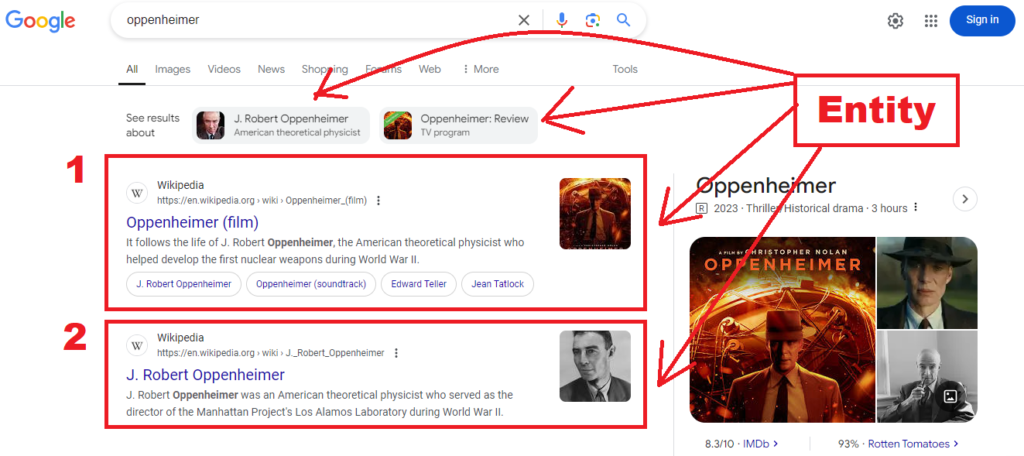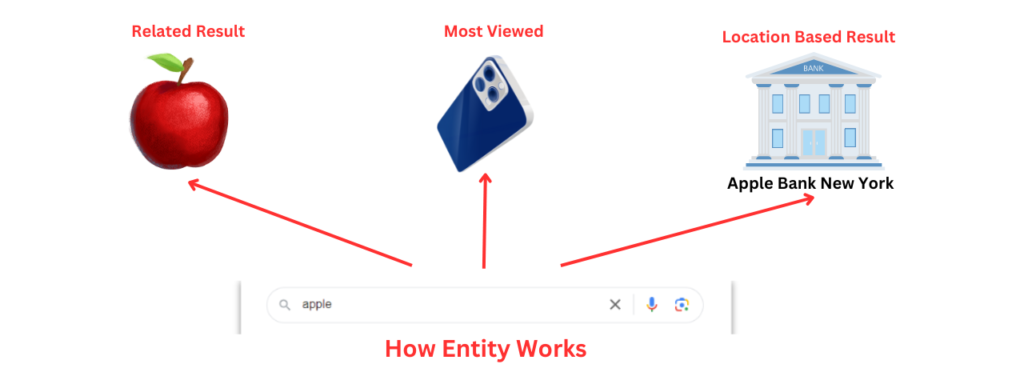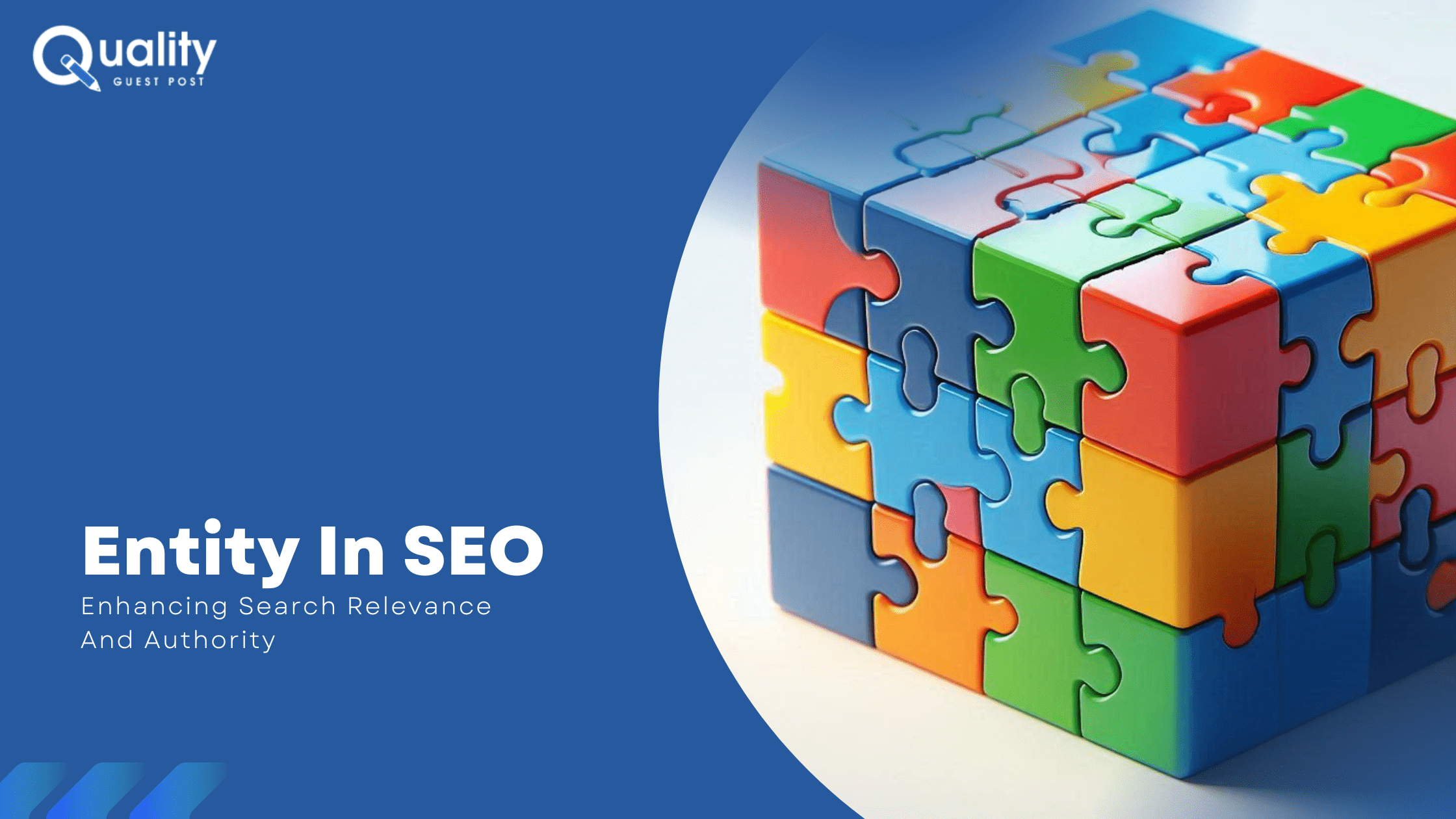Any distinct, unique, and well-defined object or concept that search engines can identify and comprehend is referred to as an entity in the context of search engine optimization (SEO). This could apply to a certain individual, location, group, occasion, or even an intangible idea like happiness. Because entities have contextual meaning that search engines can employ to provide relevant search results, they are more important than words alone.
What Is Entity SEO?
In the context of SEO, understanding what does entity mean is crucial, entity SEO has emerged as a result of the advancement of artificial intelligence (AI) and search engine algorithms. In entity SEO, keywords are still useful, but their context and relevancy are much more important.
An innovative strategy that might improve your web exposure is entity SEO. Entity-based SEO revolves around the idea of entities themselves rather than just keywords. In the online world, entities can be any combination of people, locations, objects, or abstract concepts with a clear and distinct identity. By creating knowledge graphs from the Google Knowledge Graph, LinkedIn, Wikidata, or Amazon’s product graph, entity SEO links these entities and comprehends their meanings, contexts, and intents.
For instance, if you search for “Oppenheimer,” results for the 2023 movie appear first, then information about the American physicist J. Robert Oppenheimer and an investment bank using the same name. The extra results were returned by Google without the use of search phrases like “movie” or “scientist.”

Search engines can comprehend the intent and underlying meaning of a query thanks to entities. Search engines can provide consumers with more accurate and contextually relevant results by comprehending entities and their relationships.
Why Are Entities Important?
The way individuals conduct searches has led to the increasing significance of define entity searches. The discoverability and presentation of content have been impacted by the enormous rise in popularity of voice search, tailored search results, and mobile search in recent years. As a result, entities have emerged that facilitate search engines’ ability to provide precise results for a given search query.
Entities are crucial for the following reasons:
Their Role In Core Algorithm
Disambiguating concepts is the primary objective of using entities, not ranking websites according to the same concepts. Nonetheless, you can strategically use entities to improve the ranking of the content on your website. It takes a long time for search engines like Google to transform text passages into underlying things. It takes place when they examine a user query and index your website.
Language Agnostic
Entities are highly valuable to search engines since they are not dependent on any one language. Furthermore, the concept implies that a thing can be explained using a variety of mediums. Given its iconic status, an image of the Empire State Building is appropriate for discussing the structure.
Additionally, the building’s official webpage or a speech file may be present. They all serve as legitimate labels for the object. They occasionally serve as legitimate identifiers in other knowledge graphs.
Connections Between Entities
The way entities interact with one another enables you to create material that will rank. There are much fewer relevant search results when two entities are put in a search. You’ll only find a limited number of pages that are centered around the entities you specified when you include numerous entities in your search query.
The conversion rate will be significantly greater even though just a small percentage of users may type a term with multiple elements. The concept—the fusion of several entities—can be used to create compelling pages. You must first examine every page that is contending for the search term. It will assist you in determining how significant the underlying entities are in relation to the primary query.
With this knowledge, a writer can formulate a well-thought-out strategy and produce fresh material that is more authoritative than the rival pages. Despite the frequent assertions from search engines that entities have no bearing on rankings, using this method can help you create content that is more engaging for your target audience and increases website traffic.
How Google Makes Use Of Entities?
Google performs a procedure to ascertain an entity’s relatedness, notability, contribution, and prize values whenever someone searches, and then generates a SERP. These four parameters will be analyzed by Google’s entity optimization algorithm in order to establish a web link and improve user search efficiency. Google gives every entity a unique ID, which is then converted into code to aid in mapping the knowledge network. Even while the method isn’t perfect, it’s still the most sophisticated one available for constructing context for entity searches.
Keywords Vs. Entities: What’s The Difference?
It’s possible for entities to sound like keywords. Actually, they are very different. Here are the ways in which they vary and the significance of those variations.
Keywords
Words or phrases used in searches are known as keywords. They can be queries, phrases, or single words, and they are frequently the main points of interest for topics that people look up. Users searching for cosmetics lessons could type in terms like “makeup,” “tutorial,” “smoky eye,” “how to do a smokey eye,” and so on.
Since keywords relate your content to searches, they are still important. By ranking for keywords that make it easier for customers to find your brand on search engines, you want to increase organic traffic to your website. Because search engine algorithms require precise, unambiguous guidance in order to provide relevant search results, keywords have long been the foundation of search engine optimization (SEO).
Keyword stuffing, which is the practice of using your selected keyword excessively or incorporating prominent but mostly irrelevant terms, was widely employed in the early days of SEO. Search engines at the time required to frequently see a certain keyword in order to rank material correctly.
Entities
An entity is “A thing or concept that is singular, unique, well-defined, and distinguishable,” according to Google. Colors, dates, concepts, and other things can be included in this; it doesn’t have to be a tangible thing. People, places, things, businesses, and abstract ideas can all be considered entities. They must always be unique and unrelated to other words or entities.
Search engines can now provide more accurate results since they are prioritizing entities over keywords. Search engines, however, are not psychics; they require more information in order to identify the exact entity you are looking for.
For instance, typing the word “apple” into a search engine could turn up results on the fruit or the business. Despite the interest in both subjects, reading about iPhones is probably not going to help you if you’re trying to find out if apple seeds are dangerous. To specify which entity you mean to the search engine, you must add a few keywords.

Entities can be thought of as broad topics that contain keywords. Entities must link to a search engine knowledge graph that represents connected facts and information from across the internet in order to be considered legitimate. Search engines can more efficiently crawl your website thanks to knowledge graphs.
Wikipedia served as Google Knowledge Graph’s main reliable seed set. Entities can be conceptualized simply as everything that has the potential to have a specific Wikipedia article assigned to it. Remember that not all entities are listed on Wikipedia. This might well be a useful conceptualization of the idea.
How To Optimize Content Accordingly?
In order to make sure that content is optimized in accordance with entity-based SEO principles, it is important to employ multiple strategies:
Identify Relevant Entities
Conduct thorough research. Find concise entities that are relevant to the topic of your writing. These entities could be individuals, locations, groups, occasions, or ideas that are essential to the topic at hand. To ensure a seamless procedure, create a comprehensive SEO checklist.
Incorporate Entities Naturally
Naturally, incorporate the specified items into your content. Verify that they complement the text’s overall meaning and relevance and fit within its context. Steer clear of packing keywords. Concentrate on providing the reader with important information.
Utilize Structured Data Markup
Use structured data markup or other suitable formats to provide clear definitions for the entities that are contained in your material. Rich snippets are displayed in search results thanks to this markup, which also helps search engines comprehend the relationships between items.
Optimize For Semantic Search
Put more emphasis on context and intent when optimizing for semantic search rather than specific keywords. Provide material that goes beyond mere keyword matching to fully address user inquiries and offer insightful information.
Enhance User Experience
Give the user experience top priority. Make sure everything is in logical order. It must be engrossing, easy to read, comprehensive, and educational. Include headings that provide context. To boost readability and break up the boring nature of text, use multimedia components and bullet points.
,br>Monitor Performance
Conduct SEO audits on a regular basis. Keep an eye on the performance of your optimized content. Make use of analytics software. Monitor key performance indicators (KPIs) such as organic traffic, click-through rates, and engagement to assess the success of your optimization efforts and make any improvements.
Conclusion
In today’s intricate digital environment, entity-based SEO is critical to optimizing online presence. Accepting the shift from keyword-centric search optimization to entity-oriented search optimization helps brands become more visible and credible. Maintaining competitive advantage requires tracking entity-based SEO efforts with accurate KPIs and making adjustments in response to ongoing algorithm updates. In the end, a brand’s ability to creatively use entities to ensure long-term visibility and user engagement is what determines success in the contemporary SEO era.

